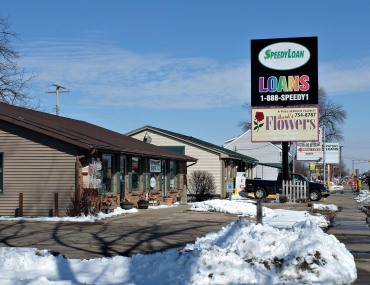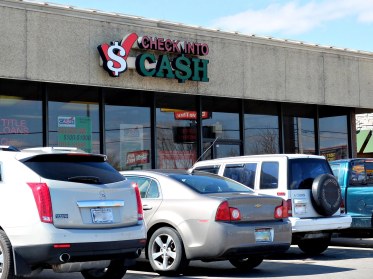
In the last few years a sure sign of declining economic capabilities among the working poor has been the proliferation of “payday” loan businesses. Here in Wisconsin, the state in which I live, these businesses have sprouted like weeds in every small town across the state. The growth of the payday loan business is viewed by many to be a national problem and it is coming under close scrutiny at the local and national level. Making short term loans at high interest, these businesses often trap borrowers into a renewal of their loans at the same high rates of interest that are now compounded, plunging borrowers deeper and deeper into debt.
In Wisconsin there were no regulations on payday loans before 2010. At that time the Democratically controlled legislature put some regulations into law that went into effect in December, 2010. The incoming Republican administration of Scott Walker, however, softened the regulations, making the rules more lender friendly (Milwaukee Journal-Sentinel).

The Wisconsin law now states that payday loans must not exceed $1,500 or 35% of a borrower’s monthly income, whichever is less. The loans must not exceed a term of 90 days. They are usually secured with a post-dated check or electronic transfer agreement in the amount of the original plus the accumulated interest. The maximum rate of interest per 15.5% over the term of the loan (National Conference of State Legislatures).
A state required form distributed to every borrower states clearly that in Wisconsin the average annual percentage rate per loan is 564.70% (Wisconsin, DOB/LFS/001P (R 01/16).
According to the Capital Times of Madison, Wisconsin less than half of payday loan borrowers pay off their loan by the maturity date, and a third roll over their loans within twenty four hours (The Capital Times).

Not surprisingly, many of the lenders have found these regulations too restrictive and have found ways to avoid them. The easiest measure is simply to extend loans beyond 90 days, thus avoiding payday loan requirements. These extended loans are called unsecured “installment” loans and are not subject to payday loan regulations. Like the standard payday loan, they are extended to borrowers at extremely high interest rates. It is not unusual for the interest rates on these loans to be far above 500%. In addition, Wisconsin also permits car title loans; that is, loans that use the borrower’s auto as collateral for the loan. Generally, borrowers must leave a copy of their car title and a set of keys with the lender. If the loan is not repaid with interest on the specified date, usually 30 days, the automobile is repossessed. This kind of loan is especially precarious for the borrower who risks his or her automobile to secure the loan. The automobile is often the borrower’s only means of transportation to and from work.

The author of the previously cited article mentions that Wisconsin payday loan businesses are more regulated than in some states. Texas, for example, puts no regulations on payday lenders. In that state only one third of the borrowers pay off their loans at maturity.
The net effect of the payday loan business nationally is that it transfers money from those who can least afford it to the upper ranks of the financial world. In other words, it removes consumer demand from the economy as it enriches those who make their living through investments in the instruments of finance capital. Since the recession of 2008, it has been shown by numerous sources that the growth of finance capital has generated pernicious effects for main street.


Nicely written expose Charlie. Cheers, Mike
LikeLike
I read the entire article, Charlie.
Great report on a nasty problem. I agree completely.
LikeLike